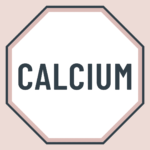Calcium Levels

What is calcium?
Calcium is an abundant mineral which we require for development and the maintenance of our skeleton, where it is stored in the teeth and bones. Smaller amounts of calcium are used as signalling molecules for the function of our neuromuscular and cardiac function.
RDI – Recommended Dietary Intake for Calcium
Age | Male Recommended intake | Female Recommended intake | Pregnancy (P) + Lactation (L) |
0-6m | 210mg | 210mg | |
7-12m | 270mg | 270mg | |
1-3yr | 500mg | 500mg | |
4-8yr | 700mg | 700mg | |
9-11yr | 1000mg | 1000mg | |
12-13yr | 1300mg | 1300mg | |
14-18yr | 1300mg | 1300mg | 1300mg (P+L) |
19-50yr | 1000mg | 1000mg | 1000mg (P+L) |
51-70yr | 1000mg | 1300mg | |
>70yr | 1300mg | 1300mg |
Sources of Calcium (vegetarian)
- Coconut milk, 200ml = 54mg
- Soy milk, enriched, 200ml = 240mg
- Almond milk, 3200ml = 90mg
- Broccoli raw, 120g = 112mg
- Rhubarb raw, 120g = 103mg
- Watercress 70g = 60mg
- Kale, collard greens, 50g = 32mg
Sources of Calcium (animal)
- Milk, 200ml = 240mg
- Natural yogurt, 150g = 207mg
- Hard cheese, 30g = 240mg
- Cottage cheese/ricotta, 200g = 138mg
- Soft cheese, 60g = 240mg
- Feta, 60g = 270mg
- Canned sardines, 60g = 240mg
- Oysters, 100g = 132mg
- Egg, 50g = 27mg
Meal options
Here is some Meal plan options rich in Calcium prepared by our expert Nutritionist
https://drive.google.com/file/d/1cAvQu0coetR_KHGTID8q4zFvP23P0y_g/view?usp=sharing
Fun Fact
- Oxalates can decrease calcium absorption, which can be found in foods such as rhubarb, spinach, chard and grains. Cooking the food, decreased oxalates!
- The average human contains 1kg of calcium throughout their body
- We effectively absorb calcium, only when magnesium is also present! We also need vitamin D to absorb calcium.

